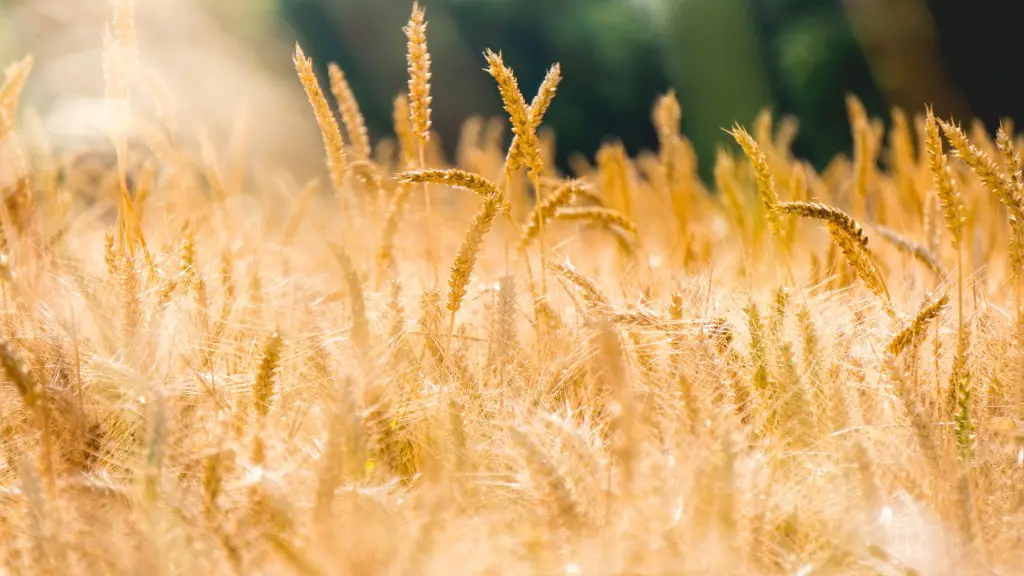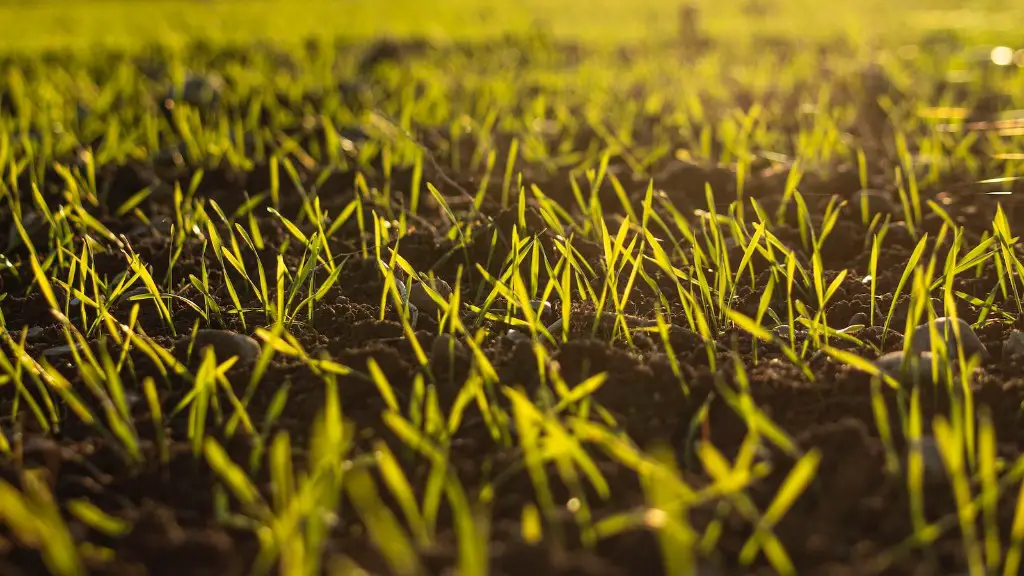A degree in agriculture can lead to many different types of jobs. Some people with this degree become farmers, while others may work in agricultural science, food science, or even forestry. With an agriculture degree, the possibilities are endless.
There are a variety of jobs that you can get with an agriculture degree. You can work in the field of agriculture production, management, marketing, and sales. You can also work in the field of food science and technology, animal science, and horticulture.
What can a degree in agriculture do for you?
Agronomists are scientists who study plants and soil. They work for banks, farm co-ops, and crop management companies. Agronomists are hired as crop consultants by farmers or by seed, fertilizer, and agrichemical companies. Some are forecasters, environmentalists, analysts, or teachers. To be an agronomist, you should have an interest in science and a bachelor’s degree.
There are many high-paying jobs in agriculture, from agricultural engineers to agronomists to food scientists. However, the highest-paying job in agriculture is probably that of a farm manager. Agricultural sales representatives also make a good salary.
Which career is best in agriculture
There are many different types of careers in agriculture, from working with plants and soil to managing farms and selling products. Agricultural engineers use their knowledge of science and engineering to solve problems in the agricultural industry, while agricultural economists use economic principles to help make decisions about farming and other agricultural businesses. Farm managers are responsible for the day-to-day operations of a farm, while soil and plant scientists conduct research on how to improve crop yields and prevent soil erosion. Conservation planners work with farmers and other land owners to develop conservation plans that protect natural resources, and commercial horticulturalists grow and sell plants for landscaping and other purposes. Agricultural salespeople work with farmers and other customers to sell agricultural products.
The Agricultural career pathway is a great way to get started in the agricultural industry. There are many different career options available in this field, and the seven pathways allow you to specialize in the area that interests you the most. Whether you’re interested in working with animals, plants, or food products, there is a pathway for you. With so many options available, you’re sure to find a career that you love in the agricultural field.
Is agriculture a good major?
If you’re considering a career in agriculture, pursuing a degree in agriculture is a great idea. While you don’t necessarily need a degree to get many agriculture jobs, having a degree can give you a leg up in the industry and open up other possible opportunities.
There are many career opportunities in agriculture for those with the right skills and training. Agricultural extension workers help farmers to adopt new technologies and practices. Agricultural engineers develop new equipment and methods to improve farm productivity. Animal scientists conduct research on animal nutrition, breeding, and health. Agricultural economists analyze market trends and policy issues affecting agriculture. Crop scientists conduct research on crop genetics, breeding, and physiology. Soil scientists study soil properties and processes. Forestry scientists manage forests and conduct research on tree growth and forest ecology. Horticulturists grow and study fruits, vegetables, flowers, and other horticultural crops.
Is it hard to study agriculture?
BSc Agriculture is not a tough course. The course is designed to provide students with the knowledge and skills necessary to pursue a career in agriculture. The coursework is challenging, but not impossible, and the workload is moderate.
Agriculture is a great opportunity to earn an income, whether on a large or small scale. There are also a lot of career options in agriculture. As the world keeps revolving, there are now different ways to earn from agriculture without owning a farm or even physically being present on the farm.
What are the fastest growing careers in agriculture
There are a few careers in agriculture, food, and natural resources that are projected to have significant job growth in the coming years. Animal caretakers, pest control workers, and refuse and recyclable material collectors are all expected to see significant increases in job opportunities. Agricultural equipment operators are also projected to see significant job growth.
If you want to make a good salary in the agriculture industry, you should focus on soil, plant life cycles, irrigation, or farm machinery. You could also work as a livestock veterinarian. With the right skills and experience, you could earn up to $100,000 per year.
What are the 6 career areas in agriculture?
Agriculture is a vital industry that provides many jobs for people across the globe. There are many different types of jobs in the agriculture industry, from farm workers and growers to agricultural equipment technicians and purchasing agents.
Agriculture specialists play an important role in helping farmers and other agricultural businesses to sell their products and grow their operations. They often work in sales and marketing, and are responsible for connecting farmers with buyers and helping to negotiate sales contracts.
Warehouse managers are responsible for overseeing the storage and distribution of agricultural products. They often work in coordination with purchasing agents to ensure that products are delivered to customers in a timely and efficient manner.
Overall, there are many different types of jobs in the agriculture industry that provide a good living for those who are interested in working in this field.
The average agriculture salary in South Africa is R 582 690 per year or R 299 per hour. Entry-level positions start at R 318 000 per year, while most experienced workers make up to R 5 382 000 per year.
What is a degree in agriculture called
Agricultural science is the study of the application of scientific principles to the management and production of crops and livestock. Agricultural science degrees encompass a wide range of topics, from animal husbandry and veterinary medicine to food science and farming. These programs are commonly offered through agriculture science departments at colleges and universities around the country.
Agricultural workers should also possess the following specific qualities:
-Dexterity: Agricultural workers need excellent hand-eye coordination to harvest crops and operate farm machinery.
-Listening skills: Agricultural workers need to work well with others.
-Physical stamina: Physical strength is important for agricultural workers, as they often have to perform physically demanding tasks.
-Mechanical skills: Agricultural workers need to be able to operate farm machinery.
What collar job is agriculture?
Blue-collar jobs are typically labor-intensive jobs that require little to no formal education. Many blue-collar jobs are in the manufacturing and construction industries, but there are also blue-collar jobs in the service sector, such as janitors and garbage collectors.
There are a variety of jobs available in the agricultural industry, from farmhands and ranchers to agricultural scientists and food inspectors. With such a wide range of positions available, it is no surprise that there is a great deal of variation in salaries. Nevertheless, across the board, agricultural jobs tend to pay relatively well, especially when compared to other sectors.
In part, this is due to the fact that agricultural products are essential to our everyday lives. Without the food and materials produced by farmers and other agricultural workers, we would not be able to survive. Therefore, it is only fitting that those who work in this industry are compensated generously for their efforts.
If you are looking for a well-paying career, the agricultural industry is definitely worth considering. With its many different positions and competitive salaries, there is sure to be a role that suits your skills and interests. So why not start exploring the exciting world of agriculture today?
What are the disadvantages of agriculture
While large-scale, conventional farming does yield high production levels, it also contributes to climate change, pollutes air and water, and depletes soil fertility. This type of farming focuses on intensive single crop production, mechanization, and depends on fossil fuels, pesticides, antibiotics, and synthetic fertilizers. In order to protect our environment and promote sustainable agriculture, we need to move away from this harmful farming system.
Crop science is the study of how to grow crops and manage land for agricultural production. The four-year course provides students with the knowledge and skills needed to become successful farmers and agricultural professionals. The program covers topics such as soil science, crop production, crop management, and agricultural physics.
Warp Up
Review the job posting requirements for the position you are interested in and see if your agriculture degree meets the minimum qualifications. Many entry-level jobs in agriculture require only a high school diploma or GED, but some jobs may require post-secondary education, certifications, or professional experience. Salary ranges for agricultural jobs vary widely depending on the position, but the average annual salary for all agricultural occupations was $63,010 in May 2019, according to the U.S. Bureau of Labor Statistics.
There are a variety of jobs that you can get with an agriculture degree. You can work in the agricultural industry, in a variety of capacities such as a farmer, rancher, agricultural economist, or agricultural engineer. You can also work in the food industry, in positions such as a food scientist, food product developer, or food safety inspector. Additionally, you can use your agriculture degree to work in environmental conservation, as a soil scientist, land use planner, or environmental educator.





